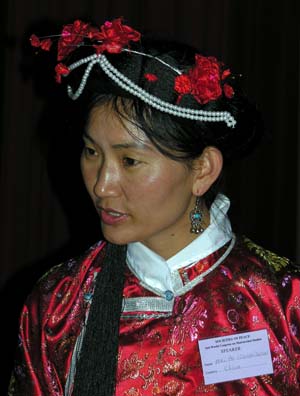
Still think matriarchies are Fig Newtons of the imagination? Go check out the speakers at last year’s International Matriarchy Conference. Each snippet below is from a different speaker:
“I was born into a very typical Mosuo family. Mosuo is regarded as a unique ethnic group mostly because we follow a matriarchal system, where the common people live their whole lives in the maternal family home and never marry their lovers. (Mosuo, China)
“Pre-patriarchal societies, such as the Khoisan of Southern Africa, are examples of harmonious, gender-continuous, nonviolent lifestyles, which can be used to construct alternative models to violence and inequity. (Khoisan, South Africa)
“The Tuareg promote a woman-centered pattern based on several principles - the necessity of diversity, contradiction and balance creating social dynamism - that finally contradict the theory of a universal male dominance over women. (Tuareg, north Africa)
“Woman-power may be a new cultural idea among Europeans and their descendants, but it is an old and mature idea among the Native Americans.... In fact, by law, the men's councils may not consider a matter that has not been discussed by the women and forwarded to them by the women's consensus.... The Iroquoian Constitution is careful to clarify that men have the same rights as women. (Iroquoi, North America)
“Our pre-Columbian culture was devoted to the reverence of Nature and the equality of gender, as evidenced by the presence and respect for female as well as male shamans.... We continue to revere Nature and renew our bond as a commitment to the Sacred Mother Earth. (Zapotec, Mexico)
Go HERE for little two-paragraph summaries of all 30-some lectures.
_____________
The foto is of Hengde Danshilacuo, one of the Mosuo speakers at the Conference.
1 comment:
Heard a story yesterday on NPR about farmers somewhere in Africa, but never didhear where exactly. Anyway, the land rights ALWAYS pass through the female line. The man in the story was growing rubber on the family farm, but once he dies his aunt's sons will inherit-he having received stewardship via his mother-since he has no sisters. He thought it was unfair but said that is how it had always been, and that even the modern law of the nation recognized the matrileneal system. I think both- m & p are unfair. Inheritance should be given as the deemer sees fit-if s/he were able to do so without societal bias being imposed on their thinking.
Post a Comment